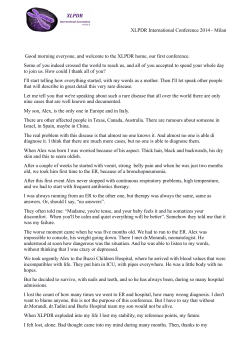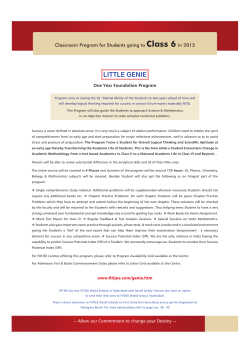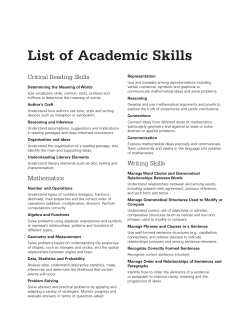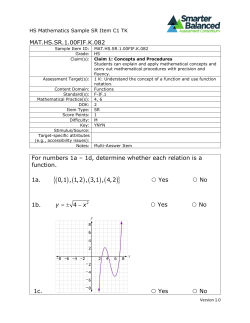
TACC Workshop description - International Council for Scientific and
ICSTI 2015 Annual Members’ Meeting Monday, 19 January 2015 NH Hotel Berlin Mitte (Room Friedrich 3), Leipziger Strasse 106 -111, 10117 Berlin, Germany The Technical Activities Coordinating Committee (TACC) Workshop for the International Council for Scientific and Technical Information (ICSTI) will be held on Monday, January 19, 2015 in Berlin, Germany, as part of the ICSTI 2015 Annual Members’ Meeting. TACC typically focuses on exploring and communicating technical aspects of innovative trends in information science-based tools that help make STI more useable and accessible. The Chair of TACC is Mr. Brian Hitson, US DOE Office of Scientific and Technical Information (OSTI). Standing in for Brian at the Berlin meeting will be Ms. Debbie Cutler, also from OSTI. Innovations in Search and Analysis TACC Workshop Description – Status 17 December 2014 This workshop will provide updates on techniques, technologies and tools that make text or non-textual information more discoverable or that help guide users across different forms of scientific and technical information (STI) text, multimedia, numeric data, etc. Confirmed Speakers (Alphabetical order) Debbie Cutler, International Program Manager – DOE/OSTI, Oak Ridge, TN USA Deborah (Debbie) Cutler joined DOE’s Office of Scientific and Technical Information (OSTI) in 1980. She has held several positions at OSTI, ranging from editorial to computer programming-related positions to managing OSTI’s international program. She has managed the Energy Technology Data Exchange (ETDE), an international information exchange agreement under the International Energy Agency framework, for over 20 years. She also has represented the U.S. as alternate delegate for the International Atomic Energy Agency’s International Nuclear Information System. She has a Bachelor of Arts in English from the University of Tennessee, with graduate work in computer programming. ‘WorldWideEnergy: a paradigm shift in advancing energy information access’ The countries involved in the former IEA agreement known as the Energy Technology Data Exchange (ETDE) have created a new model for an information sharing system. WorldWideEnergy (http://WorldWideEnergy.org) 1 ICSTI 2015 Annual Members’ Meeting TACC Workshop Innovations in Search and Analysis --------------------------------------------------------------------------------------------------------- (WWE) builds on the successful federated searching tool WorldWideScience model in that it searches deep-web databases, including the massive ETDEWEB and INIS collections, but it also searches websites that have energyfocused information to access very timely information. WWE currently searches over 1000 databases/websites, and allows for searching in 4 languages: English, German, Spanish, and Swedish. This paradigm shift in how the collection is built has enabled participants a way to disseminate their research results without the expense of translated, common metadata creation, and gives users access to even timelier and wider information types. Niels Dam, VP Product Management – ProQuest Information Solutions, London, UK Niels Dam is the Vice President for Product management at ProQuest Information Solutions. He oversees a broad set of STM A&I and full text databases as well as the global Dissertation dissemination program and lead development of new digital services in video curation and text and data mining. Niels previously served as Co-chair of the NISO Business Information Topic committee and has a diverse experience from a number of strategic, sales and product management roles within the STM industry at first Elsevier and most recently at ProQuest Information Solutions. Niels has a background as a research scientist with a PhD from University of Aarhus, Denmark, in Chemical Physics and as a Post-Doctoral fellow at the Nanomaterial and Nanomanufacturing Research Center in Tampa, Florida, before obtaining an MBA with distinction from London Business School. ‘Uncovering the hidden treasures: Enabling video discovery and preservation for future generations’ While the volume and importance of video content is growing exponentially and users are engaging with video content in unprecedented ways, rich video assets from universities, government institutions and museums remain hidden, inaccessible and invisible to the wider world. Video is becoming increasingly used for research documentation, to learn new technologies and surgical procedures and to capture oral histories for generations to come. However digital video material often remain siloed, is not sustainably preserved for future use and with poor discoverability with limited and inadequate meta-data. For historical content VHS tapes and reels of 16mm film continue to be boxed in archives, offices and storage facilities. By making video content more discoverable and accessible, institutions have an unprecedented opportunity to showcase their rich heritage and enhance teaching and research for future generations. The presentation will discuss research on using automatic speech to text transcription to improve discoverability of video resources and how preserving video in a sustainable digital form to make it accessible for researchers now and in the future. Margret Plank – German National Library of Science and Technology-TIB. Since 2010 Margret Plank is Head of the Competence Centre for Non-Textual Materials at the German National Library of Science and Technology in Hannover (Germany). The aim of the Competence Centre for Non-Textual Materials is to create an infrastructure and develop tools and services that actively support users in the scientific 2 ICSTI 2015 Annual Members’ Meeting TACC Workshop Innovations in Search and Analysis --------------------------------------------------------------------------------------------------------- work process enabling non-textual material such as AV media, 3D objects and research data to be published, found and made available on a permanent basis as easily as textual documents. She has a Master Degree in information science and media studies and subsequently worked as a researcher at the Institute of Information Studies and Language Technology of the University of Hildesheim. Since 2007 she has been working for the German National Library of Science and Technology, in her first position she was a referent for Information Competence. She has published on the subject of usability und multimedia retrieval and gives classes in the field of social media. ‘The TIB|AV-Portal: Innovative video search and citation on the segment level’ The German National Library of Science and Technology together with the Hasso Plattner Institute (HPI) has developed a web-based portal for audiovisual media that optimises access to scientific videos in the field of science and technology (www.av.getinfo.de). The portal was launched in April 2014. It combines state-of-the-art multimedia retrieval techniques with semantic analysis to allow users to quickly find videos at the segment level. The spoken language, text overlays and image information contained in the video are automatically analysed and indexed. The extracted terms are then linked to context information, enabling searches that make use of synonyms, broader and narrower terms. The portal also allows for cross-lingual retrieval (German/English). By using the open standard Media Fragment Identifier (MFID), a citable Digital Object Identifier is displayed for each video segment. In this talk Ms Planck will present the technology which was used for the portal, followed by a live demo and future work. Olaf Teschke – FIZ Karlsruhe Dr. Olaf Teschke is a mathematician, who obtained his PhD at Humboldt University, and held several research and teaching position at Berlin and Cottbus, in the fields of algebraic geometry and mathematics education. In 2008, he joined FIZ Karlsruhe as Head of Department of Mathematics and Computer Science. He is member of the Executive Board of the European Digital Mathematics Library, the Electronic Publishing Committee of the European Mathematical Society, and the recently formed working group for the Global Digital Mathematics Library. ‘Dealing with mathematical knowledge at large: recent approaches to semantic and formula search in math databases and digital libraries’ The language of mathematics has many specifics: notably, a high level of formalization, the persistence of the included results, and a large amount of formulae. Therefore, mathematical information on the web, as stored in research databases or digital libraries, requires adapted tools of information storage and retrieval. We give examples for recent developments like formula search and semantic methods, and an outlook to their integration into the envisioned Global Digital Mathematics Library. 3 ICSTI 2015 Annual Members’ Meeting TACC Workshop Innovations in Search and Analysis --------------------------------------------------------------------------------------------------------- Alex D. Wade, Director, Scholarly Communication, Internet Services Research Group – Microsoft Research, Redmond, WA Alex Wade is Director for Scholarly Communication at Microsoft Research, where he oversees a portfolio of research-focused products and services. Alex holds a Bachelor's degree in Philosophy from U.C. Berkeley, and a Masters of Librarianship degree from the University of Washington. During his career at Microsoft, Alex has managed Microsoft’s internal corporate search and taxonomy management services, and has served as Senior Program Manager for Windows Search for the Windows Vista and Windows 7 releases. Prior to joining Microsoft, Alex was Systems Librarian at the University of Washington, and held technical library positions at the University of Michigan and the University of California at Berkeley. Alex is currently responsible for the Azure Machine Learning for Research program as well as Microsoft Academic, a service designed to enable rich entity-based discovery and navigation of researchers, topics, conferences, and publications ‘Proactive Discovery and Semantic Search – a more in-depth look’ Web-scale search has been around for more than twenty years, and it is now evolving beyond simple keyword based search to support better understanding of the content, large-scale mapping of the world's knowledge, and richer ways to elicit user’s intent. As a result, web-scale search can now provide richer discovery than ever before, and to bring the right content and answers to users when and where it is needed. The main APE presentation will cover several new approaches to academic information discovery; this session is intended to present more in depth information about a specific aspect of the main topic. ------------------------------------------------------------------------------------------------------------------------------------------We are very grateful for the financial support towards the ICSTI 2015 Annual Members’ Meeting provided by 4
© Copyright 2025









